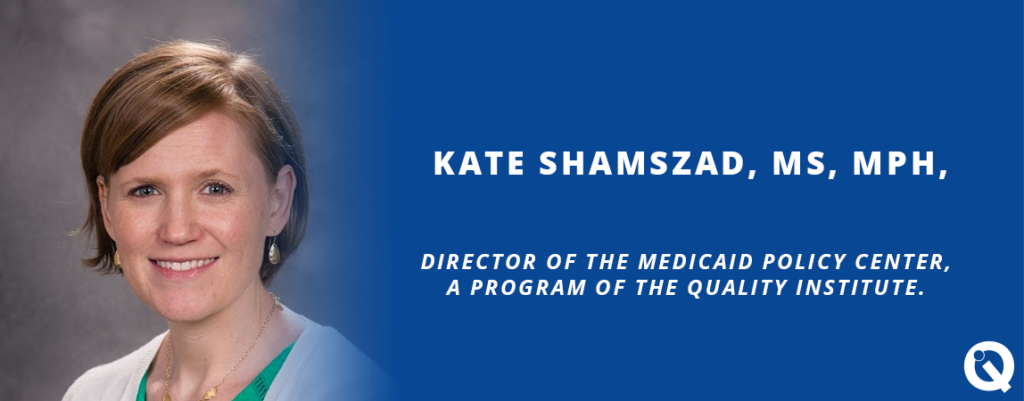Kate Shamszad, MS, MPH, Director of the Medicaid Policy Center, a program of the Quality Institute.
As the new Director of the Medicaid Policy Center (MPC), what are your short and long-term priorities for the program?
It’s been a really busy last year with the onset of the COVID-19 public health emergency. Maintaining high quality health care amid such changes will remain a focus of ours from a short-term perspective. How do we transition to a normal state of health care, particularly as we see the Medicaid program expanding? From a long-term perspective, since we launched the Medicaid Policy Center we have clearly seen that health care has no bounds. So we’re looking at how quality care is provided more broadly. How does quality and access to health care affect everyone in New Jersey, whether they have Medicaid, private insurance, or no insurance? That is at the core of the work of the Quality Institute. Our focus is ensuring that the health care experience is equitable, of high quality, accessible, and affordable for everyone, regardless of the person’s insurance.
I have worked closely with Matt D’Oria, the previous director of the MPC, for three years and am so thankful for all that I have been able to learn from his expertise about Medicaid and health care in New Jersey. Though he will be transitioning from this role, I am glad that we will still have his expertise. Matt is now a Senior Policy Advisor for the Quality Institute and will continue to work on projects with us, including the Integrated Care for Kids (InCK) program.
How does your background support your work leading the MPC?
I’ve worked more than 15 years in pediatric health care settings as well as other clinical settings; my work directly with patients and families shapes the way that I’m able to think about how we provide care to them. And then also moving through health care systems, both as a clinician and as an administrator, allows me to better understand what happens on the provider side instead of just looking at it from a policy lens. Specifically, I worked as Clinical Director of Child Life and Integrative Care at Cincinnati Children’s Hospital Medical Center. I did my training as a child life specialist at Bellevue Hospital in New York and began my career there; my earliest experiences still impact my work in this new role.
The Medicaid 2.0 Blueprint for the Future is what jumpstarted the MPC at the Quality Institute. Is progress still being made on those recommendations?
The Blueprint is still very much a focus on what we do; about half of the 24 recommendations either were implemented or are in progress. We regularly turn to the Blueprint as a North Star when we work to advance best practices surrounding Medicaid. That holds true, not just for the Quality Institute, but also for our many members. The Blueprint is often referenced in our conversations and in our work.
How can Quality Institute members engage with the MPC?
We have a number of different programs and work groups that we run regularly as part of the MPC, including the Partnership Council for our InCK grant. Our work in maternity involves many of our members. We encourage any of our Quality Institute members to reach out to us at the MPC if they have a question about how the program works, or they want to share an example of what’s working well — or not working — within their own organization.
What are some of your interests outside of your work with the Quality Institute?
I spend a lot of time with my family. I have two young children, and, like a lot of people during the pandemic, I’ve been doing a lot of baking, and we’ve been cooking together as a family. More recently, I’ve started running, and found that I enjoy the time to myself…and to counteract all the baking.

